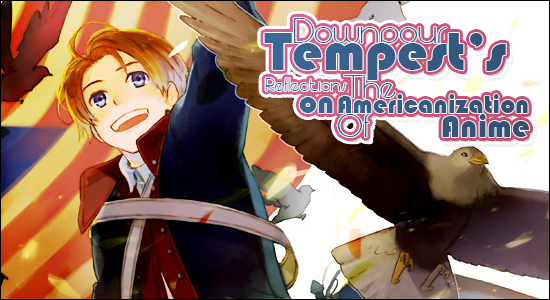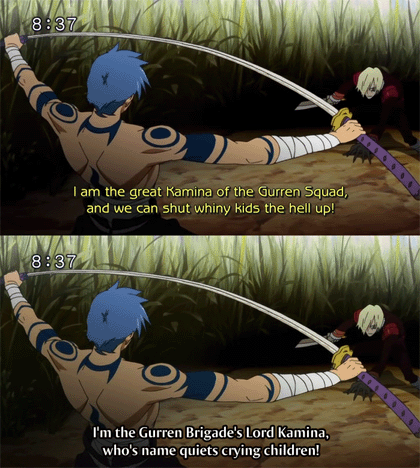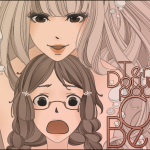Tempest’s Downpour – Reflections On Translation And Americanization

I know, I know: I just wrote an article on how the localization of anime is probably a good thing even though it’s easy to fall back on “Americanization iz evul.” And, hard as it is to change my opinion after so many years suffering through bad, bad, bad dubs, I’ve come to the conclusion that there is a large number of shows that have benefitted from a more American-friendly script (Fruits Basket, Fullmetal Alchemist, Axis Power Hetalia and a lot of other really good FUNimation projects). I WISH FUNimation was paying me to say all this, but instead I pay them in order to watch their shows.
So it goes.

This company owns my soul
Recently, I listened to a Russian version of Hatsune Miku’s song “Love is War.” After listening to it approximately 30 times, I realized I’d become obsessed with it, and thus had to do the only logical thing: learn the English version of it.
I was disappointed to find that the lyrics were neither bloody nor filled with war analogies. Also, the lyrics were so painfully close to the original translation that the words didn’t fit in very well with the music in any of the versions I listened to.

A chibi Miku figure with her Love is War megaphone
I sat down to write my own take on the lyrics and beef them up with something tragic and violent. That’s when it hit me – I was taking someone else’s art and making something new and personal out of it. Was it stealing? Was it even still the same song at the end of the day? And is this what it feels like to localize anime?
I changed the meaning of every line and my first draft didn’t pay any heed to the original lyrics. It wasn’t until the second draft that I finally tried to incorporate the main idea of the words.
It reminds me of shows like Robotech, where the company took the bright, flashy animation, cut everything they wanted to from it, rewrote the script and re-dubbed it entirely without a passing thought for the original content. “LOOK! Shiny, big robots. Kids will LOVE this and buy all our toys!”

All this in the name of selling cool Robotech action figures
Admittedly, dubbing companies in the past cut down the violent content to make something more kid-friendly for a country as tight-lipped about its own morals that broadcast stations don’t even know the rules of censorship. And it took a good many years for American companies to get the hang of matching voices to lip-flaps, which, according to voice actors, is as easy as jumping through hoops on a trapeze while on fire.
My rendition of “Love is War” isn’t trying to match lip-movements, though it is trying to fit better with the tune of the song. A message that can take twenty syllables to say in Japanese can come out as five syllables in English, which makes it impossible to do exact translations. It’s the frustration of every translator and script-writer, and probably why anime rarely have just one writer in the dubbing staff.
To make matters worse, Japanese doesn’t translate easily into English in any way, shape or form. Japanese is a language laden with concepts and very few concrete ideas in comparison to English. In Japanese, one word can have twenty meanings and can be used differently depending on where it sits in a sentence and what words surround it.

Direct translations like this one are laughable in English
The opening lines in “Love is War” start as “mou yukiba ga nai wa” which literally translates to “this place has not is.”* The translator wrote the phrase as “I have no place to go.”
Imagine having to translate an entire song – nay, an entire series – when the only words are loose concepts that can have twelve different meanings. When “Lonely in Gorgeous” by TommyFebruary6 first came out, I read two completely different translations of the song, with completely different meanings, but both stayed relatively true to the Japanese lyrics. Then there were English lines that got so mixed up and confused that one version called the narrator a “scholar” while the other referred to the “scarf” she was wearing (“suca-rufu” is actually the Japanese pronunciation of the English word “scarf,” but it sounds pretty close to “scholar” as well).
It’s for this reason that we can find totally different translations when we watch something fansubbed versus watching something that has been officially subtitled and released by a company. Then the words have to be adapted into English with a meaning that actually registers as interesting in American minds. Back in the olden days when dinosaurs roamed the earth and anime was carved out of stone, I remember watching some subtitled shows that were so technical with their translations that my eyes glazed over out of boredom.

Top: fansubbed anime, bottom: official subtitles
Nowadays, American dubbing companies seem to have a good feel for their audiences, and the Japanese companies are releasing content that appeals to fans. I don’t know if this from working together or a happy coincidence, but I do know that the anime fanbase is growing. And that’s a very good thing considering the anime industry nearly collapsed just a few years ago.
*Don’t kill me if I didn’t get the translation 100% correct. I have no formal Japanese training – just years of obsession with subtitled anime and J-pop.
















T/N: Moo means Moo
Great read. Love is War is still my fav Vocaloid song from supercell.
Atleast with the subtitles they seem to stick close to the Japanese meanings vs. the dub scripts which so often stray to a localized dialog. And as you say too often completely changing the meanings of what’s going on. I’ve shuddered many times switching back and forth between the dub and sub – thinking why did the adaptation writer have to butcher it so badly.
D’awww…wookit da wittle Miku. 😀
Well, I see the story behind the translation. I am not good with talking because of my speech impediment and it’s important that I have a solid grammatical in anything I read. If subtitles have to be very bad, I follow that bad translation without realizing that it’s bad. I rather go with an alternated translated sub. that does stay true to the meaning and not astray from making it sound awkward.
*Don’t kill me if I didn’t get the translation 100% correct. I have no formal Japanese training – just years of obsession with subtitled anime and J-pop. > epic
It’s what happens when you watch something in a different language enough. Especially when you’re still at school-age because your brain is sponge-like (not just in texture, but in quality as well! That was an insult. =D).